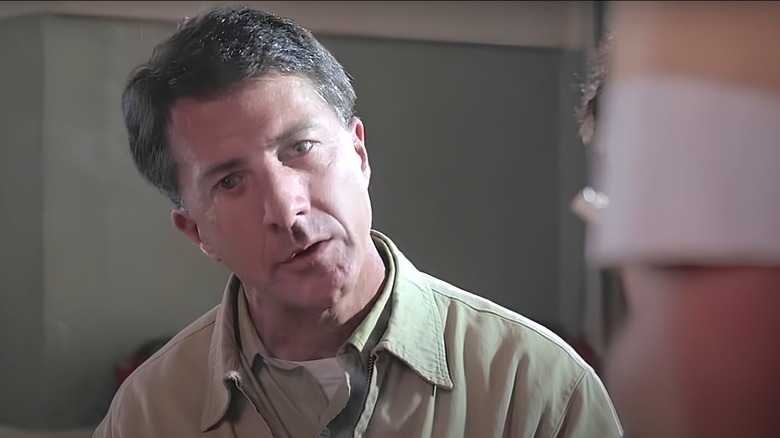Was Rain Man Based On A Real-Life Person?
Once in a great while, an actor finds themselves cast in a role that is so effective that it remains a part of their persona for the rest of their career. It happened to Joe Pesci with "Goodfellas," it happened to Jack Nicholson in "The Shining," and it definitely happened to Dustin Hoffman with "Rain Man," just as it had happened to him once before with "Midnight Cowboy."
The heartwarming story of a selfish yuppie named Charlie Babbitt (Tom Cruise) who grows to care for his troubled, autistic brother Raymond (Hoffman), "Rain Man" would go on to win four Academy Awards, including best picture. However, what many fans of the film may not know is that several real-life sources actually inspired the character of Raymond Babbitt.
According to The Guardian, Barry Morrow, who wrote the screenplay, actually kidnapped a man with learning disabilities named Bill Sackter in order to keep him from being sent back to an institution. "That's where basically I got the idea of the kidnapping of Raymond Babbitt," Morrow explained. The story would go on to inform a TV movie Morrow wrote called "Bill." Still, there was another man, Kim Peek, who also helped to inspire the character of Raymond Babbitt in "Rain Man."
Kim Peek had many of the same skills that Raymond Babbitt has
Barry Morrow also recalled meeting Kim Peek, a man who, despite being afflicted with motor function disabilities, was able to display the same type of impressive abilities that Raymond shows off in "Rain Man." Morrow recalled being wowed by Peek almost immediately. "When I met him, he knew all the credits of the movies I'd ever worked on, and every sport question I could challenge him with, he answered," Morrow explained. Peek could also read two separate pages of a book simultaneously, one with each eye, and could give directions between any two cities in the world.
However, Peek was not autistic. Raymond Babbitt's autism was a detail that Dustin Hoffman added to help get the character right. Hoffman also studied cases of people with autism and savant syndrome and eventually created Raymond's persona through a combination of these experiences.
Thus, in short, while the titular character from "Rain Man" might not be specifically inspired by any one person, he is largely based on several different real-life people. Though the film is considered to have something of a mixed legacy 35 years after its initial release, "Rain Man" is still considered by many to be a classic of its era, and according to Morrow, the film helped to raise plenty of funding for people with autism in the years that would follow its release.

